- News
- Reviews
- Bikes
- Components
- Bar tape & grips
- Bottom brackets
- Brake & gear cables
- Brake & STI levers
- Brake pads & spares
- Brakes
- Cassettes & freewheels
- Chains
- Chainsets & chainrings
- Derailleurs - front
- Derailleurs - rear
- Forks
- Gear levers & shifters
- Groupsets
- Handlebars & extensions
- Headsets
- Hubs
- Inner tubes
- Pedals
- Quick releases & skewers
- Saddles
- Seatposts
- Stems
- Wheels
- Tyres
- Tubeless valves
- Accessories
- Accessories - misc
- Computer mounts
- Bags
- Bar ends
- Bike bags & cases
- Bottle cages
- Bottles
- Cameras
- Car racks
- Child seats
- Computers
- Glasses
- GPS units
- Helmets
- Lights - front
- Lights - rear
- Lights - sets
- Locks
- Mirrors
- Mudguards
- Racks
- Pumps & CO2 inflators
- Puncture kits
- Reflectives
- Smart watches
- Stands and racks
- Trailers
- Clothing
- Health, fitness and nutrition
- Tools and workshop
- Miscellaneous
- Buyers Guides
- Features
- Forum
- Recommends
- Podcast
£1,299.00
VERDICT:
Steel-framed gravel/adventure bike that offers a smooth ride and plenty of stability
Weight:
9,800g
Contact:
At road.cc every product is thoroughly tested for as long as it takes to get a proper insight into how well it works. Our reviewers are experienced cyclists that we trust to be objective. While we strive to ensure that opinions expressed are backed up by facts, reviews are by their nature an informed opinion, not a definitive verdict. We don't intentionally try to break anything (except locks) but we do try to look for weak points in any design. The overall score is not just an average of the other scores: it reflects both a product's function and value – with value determined by how a product compares with items of similar spec, quality, and price.
What the road.cc scores meanGood scores are more common than bad, because fortunately good products are more common than bad.
- Exceptional
- Excellent
- Very Good
- Good
- Quite good
- Average
- Not so good
- Poor
- Bad
- Appalling
Ritchey's new Outback is a steel frame/carbon fork gravel frameset that offers a stable and super-smooth ride. It lacks the mudguard and rack mounts required of a true all-rounder, but if you want something that sits at the sportier end of the market it's a slick offering.
- Pros: Smooth ride, stable
- Cons: Lack of mudguard and rack mounts will put off some
I've been riding the Outback over pretty much everything I can think of – fire road, muddy bridleways, chalky hardpack, gravel, tarmac in various states of repair, and even winding singletrack – and it has coped admirably with the lot.
> Find your nearest dealer here
It's at its best when you can point it in a straight line and hammer over broken and bumpy roads and rolling terrain. Hit a hidden or unavoidable pothole at speed and it's easy to keep the Outback on track. Most times it'll just carry on with the minimum of fuss and no need for correction, and just occasionally you'll need to tap the handlebar back into line. What it won't do is dart off at a curious angle at the merest hint of irregularity, looking for any excuse to scare you witless. That means you can settle in and enjoy the ride.
You don't tend to notice smaller lumps and bumps too much. Of course, some chatter gets through to you in the saddle but the Outback is good at smoothing over high-frequency vibration. You're not shaken about like you are on some bikes, even if you're running quite high tyre pressures. That can make a big, big difference over a longer ride over rough roads when a harsher-feeling frameset can make you lose the love.
A long wheelbase means the Outback isn't the most dexterous bike through super-tight, super-slow turns – walking pace stuff – but it's happy to mix it up with the best of 'em over all other types of technical terrain. Head down slopes as steep as you dare, for example, and there's no judder from the carbon fork, and the rear tyre will keep biting on any ridiculously sharp off-road climbs you fancy tackling as long as you stay seated.
You couldn't describe the Outback as especially light, our XL model (built up with a Shimano Ultegra groupset and Ritchey WCS Zeta Disc wheels) coming in at 9.8kg (21.6lb). Ritchey claims a frame weight (including the axle and rear derailleur hanger) of 2.17kg (4.8lb). As we often say, though, you can get way too hung up on weight. I didn't actually put the bike on the scales until the end of the test period and I can't say it ever felt particularly heavy in use. It's certainly a long way from sluggish. I'd be far more interested in ride quality, especially on a bike that you're likely to ride on the dodgiest roads and tracks you can find, and that's where the Outback really scores.
The Outback doesn't feel like the stiffest bike out there either, especially if you've just jumped off a high-end carbon road machine with oversized everything. That's clearly not a valid comparison, though. This isn't a bike where converting every milliwatt into forward motion when you're bouncing around in a sprint finish is a particularly high priority. The bottom bracket area can stand up to a bit of rough treatment without undue flex, though, and the front end will get you where you want to go when you find yourself halfway through a sweeping bend at an optimistic speed. I'd say that the Outback offers a ride that's not too harsh and not too flexible for the sort of multi-surface rides it's likely to be used on.
Geometry
The Outback shares a lot of its DNA with Ritchey's Swiss Cross Disc cyclo-cross bike, but the geometry has been tweaked and tyre clearances have been increased. Let me tell you about that geometry. As mentioned, we have the XL frame here, the largest of the five sizes available. This has a 583mm effective top tube (569mm actual), a 550mm seat tube and a 180mm head tube. Both the seat tube and head tube angles are 73 degrees.
The stack on this size is 596mm and the reach is 401mm. The chainstays are 437mm on all of the Outback frames, the wheelbase on the XL model is pretty long at 1047mm and the bottom bracket drop is 70mm, considerably more than it is on the Swiss Cross.
All of that lot means you ride in a position that's quite aggressive by gravel/adventure bike standards (although not as aggressive as a typical road bike). Of course, you can use a big stack of spacers under the stem to keep the front end high, but the Outback is certainly a more sporty setup than many other bikes of this genre.
The frame is made in Taiwan from Ritchey Logic heat-treated, triple-butted steel tubing. You might think that's a good material for a gravel bike that could take the odd ding or two. It looks traditional in many ways – or at least traditional-ish. For a start, those tubes are skinny compared with those of most carbon and aluminium bikes, and you get a 68mm English threaded bottom bracket (I did say traditional-ish), which will please anyone who has suffered at the hands of a creaking pressed-in BB. It takes a slim 27.2mm diameter seatpost too.
All of the plumbing is external, the front derailleur cable and rear brake hose heading south along the underside of the down tube and the rear derailleur cable taking a route along the top of the top tube and then down the seatstay. The post-mount disc brake is fixed between the chainstay and the seatstay.
Outback up front
Ritchey's Gravel fork is full-carbon with a straight 1 1/8in steerer. Like the frame, it uses a 12mm thru-axle to hold the wheel in place and has clearance for tyres up to 40mm wide. That might depend a little on the rim and tyre manufacturer, but we had plenty of space around Ritchey's own WCS Zeta Disc wheels and semi-slick Speedmax 700 x 40 tyres. A lot of brands are offering a little more clearance than that these days, especially if they're pitching their bike as more of an all-rounder.
Speaking of that, the lack of mudguard and rack eyelets might raise a few eyebrows, especially among those hoping to use the Outback for a bit of everything, including commuting in typical UK conditions (yes, it's all about us!).
We asked Ritchey and were told they'd been omitted because the bike is designed to be sporty and to work with frame bags and a light load. Fair enough. It also allows Ritchey to use a slightly lighter tubeset than would otherwise be needed. Ritchey already offers the Ascent, which has mudguard and rack braze-ons and can be run with either 700C or 650B wheels and flat or drop handlebars. So, there you go: that's the reasoning.
As mentioned, the Outback is available as a frameset only (frame, WCS full-carbon fork, and WCS headset) for £1,299, so you can build it up however you like, or have your caring, sharing local bike shop do it for you.
As well as the Shimano Ultegra mechanical groupset, Ritchey WCS Zeta Disc wheels and Ritchey Speedmax tyres already mentioned, our test bike came with a Ritchey WCS handlebar, stem and seatpost and saddle. I won't go into depth on the components because they're not part of the package, but it all worked well. I was very happy with a 50/34-tooth chainset and an 11-32 cassette for the type of riding I like to do although you could spec a cyclo-cross chainset if you preferred or go for a 1x system with just a single chainring. Your shout.
One thing I will say is that although tyre selection is important to any bike it is absolutely crucial to a bike like this. The new tubeless-ready 40mm version of the Ritchey Speedmax has a low-profile tread down the centre with some knobbly edges that provide traction through the corners. Although it can get a little overwhelmed in really muddy conditions, it's an excellent option for gripping hard and rolling fast on chalk, gravel and anything else that's closer to firm than gloopy.
Good value?
You can get something like a Genesis Croix de Fer frameset for £499.99. That's a steel adventure bike that scores very highly for value. The four-season Mason Resolution frameset, which uses Columbus steel tubing, is £1,495. The Outback sits between those two in terms of price. You certainly don't need to spend £1,299 to get a made-in-Taiwan steel frame, but this is a very good one.
> Buyer's Guide: 18 of the best gravel and adventure bikes
The slim, steel-framed Outback is about as far away from being a 'me-too' gravel bike as you could wish to get. The lack of mudguard and rack mounts might be an issue for some, but if you're happy without and you're after a gravel/adventure bike that's sporty, stable and above all smooth, this would be a very good choice.
Verdict
Steel-framed gravel/adventure bike that offers a smooth ride and plenty of stability
road.cc test report
Make and model: Ritchey Outback (frameset)
Size tested: XL
Frameset
Tell us what the frameset is for
Here's Ritchey's little write-up:
"In the vein of all-terrain versatility, Tom Ritchey designed an adventure bike that is equally at home in the dirt as on the pavement: the Outback. The perfect tool for any ride, anywhere. The Outback features a lower bottom bracket for confident stability, yet it's still is high enough to get over any road/trail furniture. This versatile bike also enjoys generous tyre clearance and Ritchey Logic heat-treated, double-butted directional tubing [it says triple-butted on the frame].
"The Outback frameset includes the new Ritchey Carbon FibereGravel thru-axle fork for a confident and precise front end, and it can accommodate tyres up to 40mm wide. The Outback's impressive handling is more than capable on- or off-road''in any situation. Riders seeking a bike able to effortlessly switch between fire roads, trails, tarmac, long distance mixed-terrain adventures and everything in-between will find the Outback a prime specimen for enjoying such differing and distinct disciplines of riding."
State the frame and fork material and method of construction
The frame is made from a Ritchey Logic steel tubeset. It's TIG welded.
The fork is a Ritchey Carbon Fiber Gravel thru-axle – that's full-carbon as opposed to carbon/alu.
Overall rating for frameset
8/10
Tell us about the build quality and finish of the frame and fork?
The quality is very good throughout.
Tell us about the geometry of the frame and fork?
I've covered this in the main write-up. The Outback puts you into a more upright riding position than you get on a standard road bike but it's not as upright as some other gravel/adventure bikes out there.
The chainstays are pretty long and that gives you a long wheelbase. The bottom bracket drop is greater than you get with a cyclo-cross bike.
How was the bike in terms of height and reach? How did it compare to other bikes of the same stated size?
As mentioned, the reach is a little longer than you get on some gravel bikes of a similar size and the stack is a little lower. The geometry puts this bike towards the sportier end of the gravel market although, as usual, you can keep the front end higher with headset spacers under the stem.
Riding the bike
Was the bike comfortable to ride? Tell us how you felt about the ride quality.
I'd say that the smoothness of the ride is one of the Outback's overriding characteristics. Of course, the 40mm wide tyres help.
Did the bike feel stiff in the right places? Did any part of the bike feel too stiff or too flexible?
It's not a mega-stiff frame but it's not especially flexy either. The front and rear of the bike feel pretty well balanced.
How did the bike transfer power? Did it feel efficient?
As above, really. I'd say this is a bike that has more of an emphasis on ride quality.
Was there any toe-clip overlap with the front wheel? If so
The tiniest amount. I didn't even notice it in use.
How would you describe the steering? Was it lively I'd say the Outback is more about stability than manoeuvrability.
Rate the bike for efficiency of power transfer:
7/10
Rate the bike for acceleration:
7/10
Rate the bike for sprinting:
7/10
Rate the bike for high speed stability:
9/10
Rate the bike for cruising speed stability:
9/10
Rate the bike for low speed stability:
9/10
Rate the bike for flat cornering:
7/10
Rate the bike for cornering on descents:
7/10
Rate the bike for climbing:
7/10
Your summary
Did you enjoy riding the bike? Yes
Would you consider buying the bike? Possibly
Would you recommend the bike to a friend? Yes
Rate the bike overall for performance:
8/10
Rate the bike overall for value:
7/10
Use this box to explain your overall score
You can certainly get cheaper steel frames, and ones that cost considerably more. The ride quality is unusually good and it's this that gets the Outback an overall score of 8.
About the tester
Age: 43
I usually ride: My best bike is:
I've been riding for: Over 20 years I ride: Most days I would class myself as: Expert
I regularly do the following types of riding: commuting, club rides, sportives, general fitness riding
Mat has been in cycling media since 1996, on titles including BikeRadar, Total Bike, Total Mountain Bike, What Mountain Bike and Mountain Biking UK, and he has been editor of 220 Triathlon and Cycling Plus. Mat has been road.cc technical editor for over a decade, testing bikes, fettling the latest kit, and trying out the most up-to-the-minute clothing. He has won his category in Ironman UK 70.3 and finished on the podium in both marathons he has run. Mat is a Cambridge graduate who did a post-grad in magazine journalism, and he is a winner of the Cycling Media Award for Specialist Online Writer. Now over 50, he's riding road and gravel bikes most days for fun and fitness rather than training for competitions.
Latest Comments
- dubwise 2 min 12 sec ago
Nice to see Police Scotland clamping down on road traffic offenders https://archive.is/BUiil Oh wait, they just go after the vulnerable road users.
- quiff 3 min 48 sec ago
"The algorithm" served me an older JV video last week which I now can't get out of my head....
- mitsky 1 min 3 sec ago
I pointed out the use of incorrect language to the BBC's senior transport correspondent Tom Edwards....
- Smoggysteve 12 min 21 sec ago
In the case of pepper spray, the purpose of it is to incapactate. Being sprayed will effect the eyes and breathing but the victim is targeted with...
- wtjs 26 min 40 sec ago
Please look up the words 'mysoginistic' and 'rant' in the dictionary(!!)
- OnYerBike 1 hour 7 min ago
Is that normal for that spot? Pretty sure sand (and/or other sand-like substances) is commonly used to soak up spilled diesel, so if a load of sand...
- quiff 2 hours 21 min ago
Holy thread resurrection Batman!
- mdavidford 2 hours 30 min ago
They really don't, though. They might say they do, but in reality the amount of money involved is a rounding error in the tax budget, and not worth...
- mdavidford 3 hours 54 min ago
But if it's a bridleway or a permissive path they're within their rights to be.
- Secret_squirrel 4 hours 36 min ago
This is my favourite rant - but I really dont see the point of windproof cycling clobber that isn't properly waterproof - especially for the UK. ...




























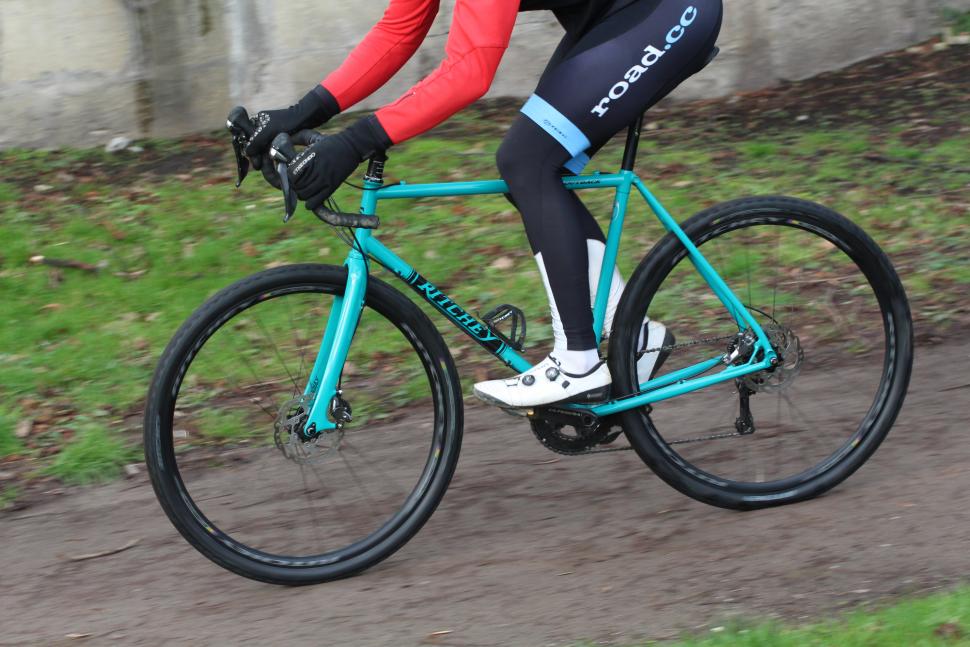
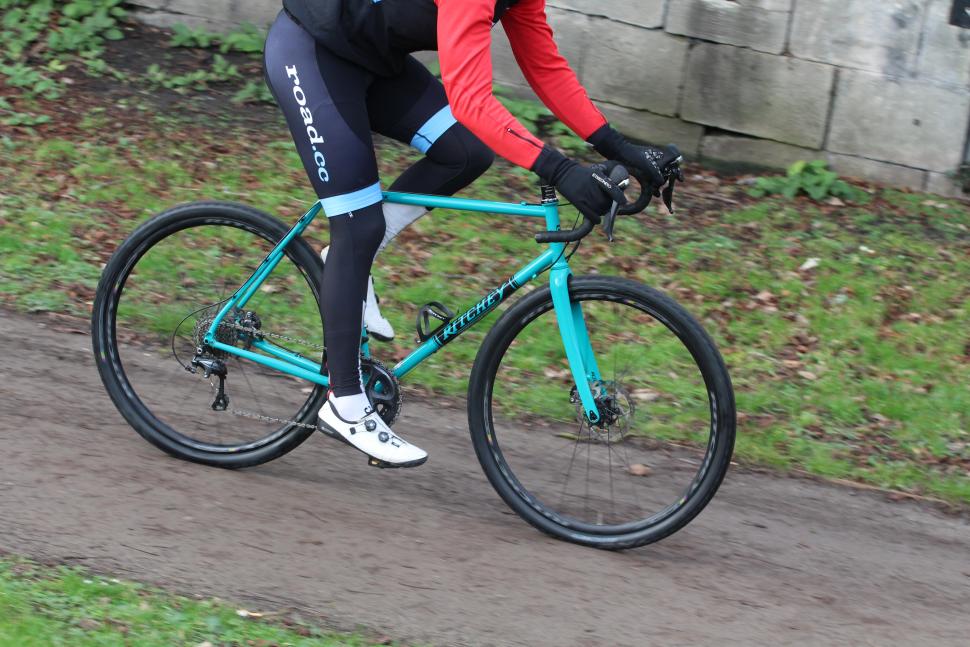
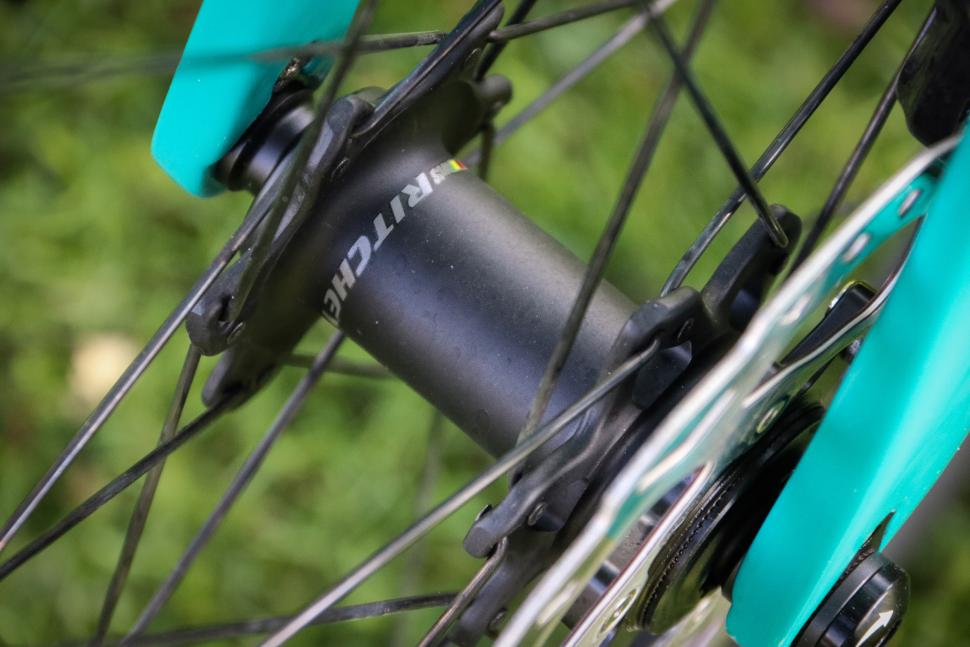
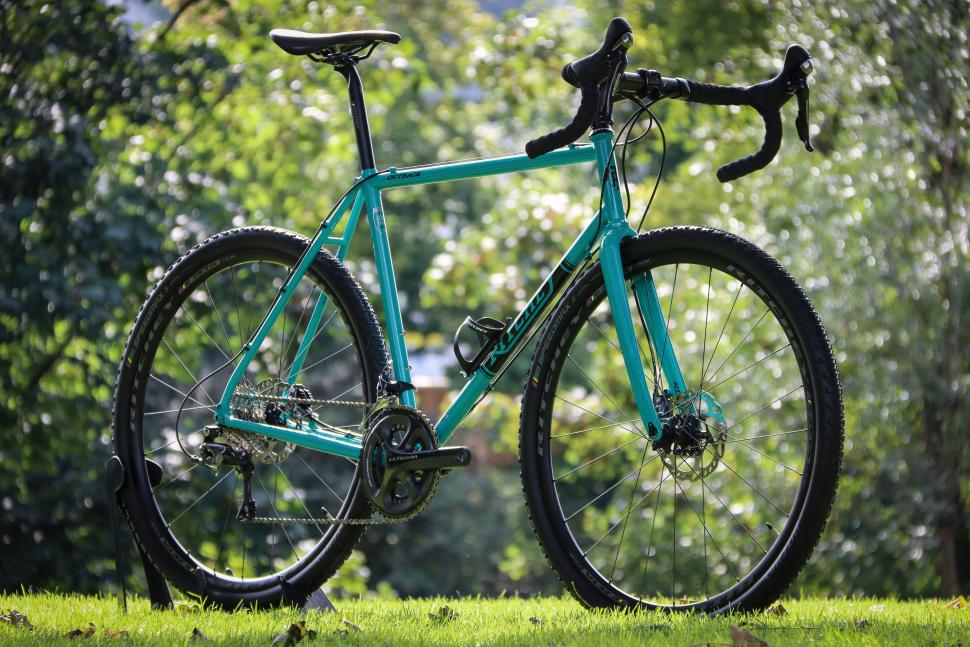
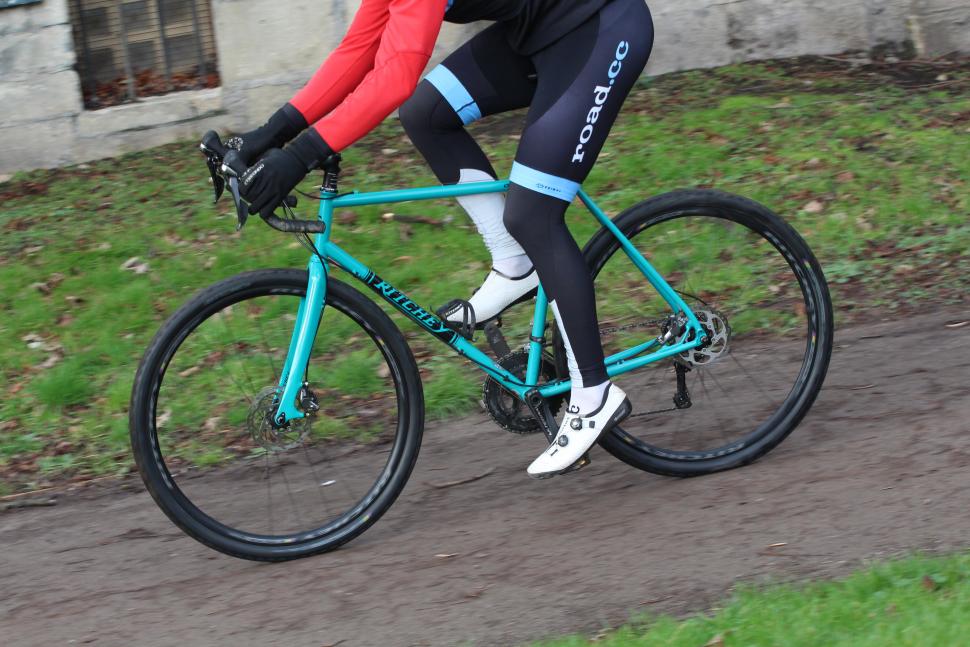

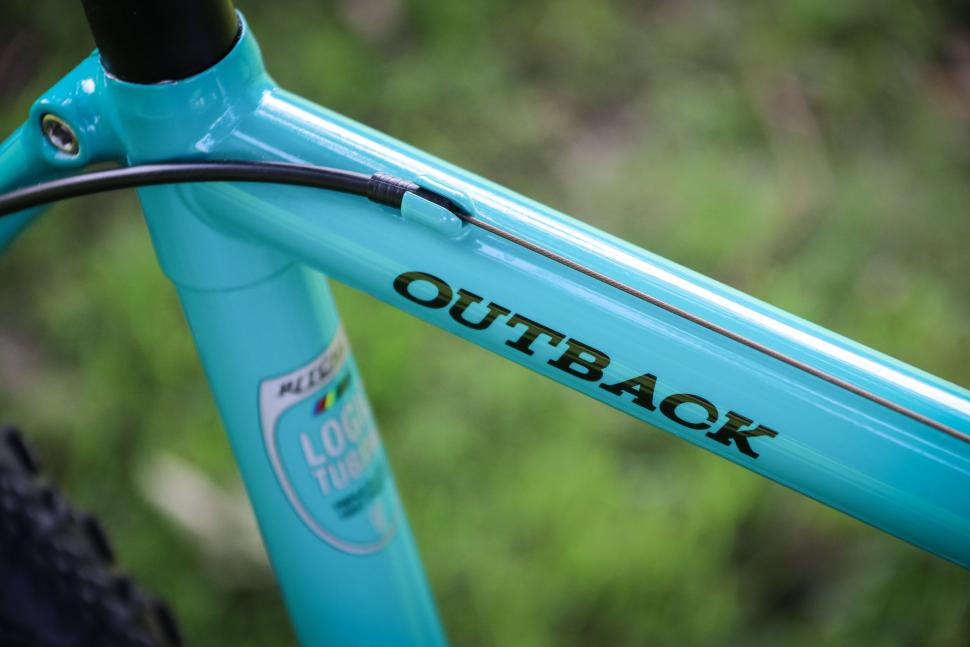
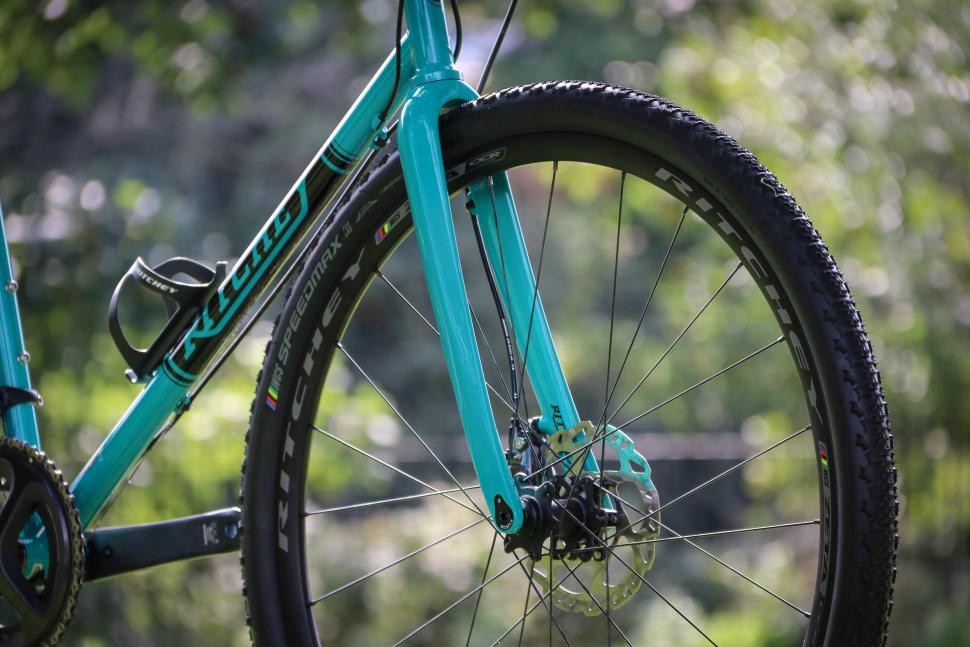
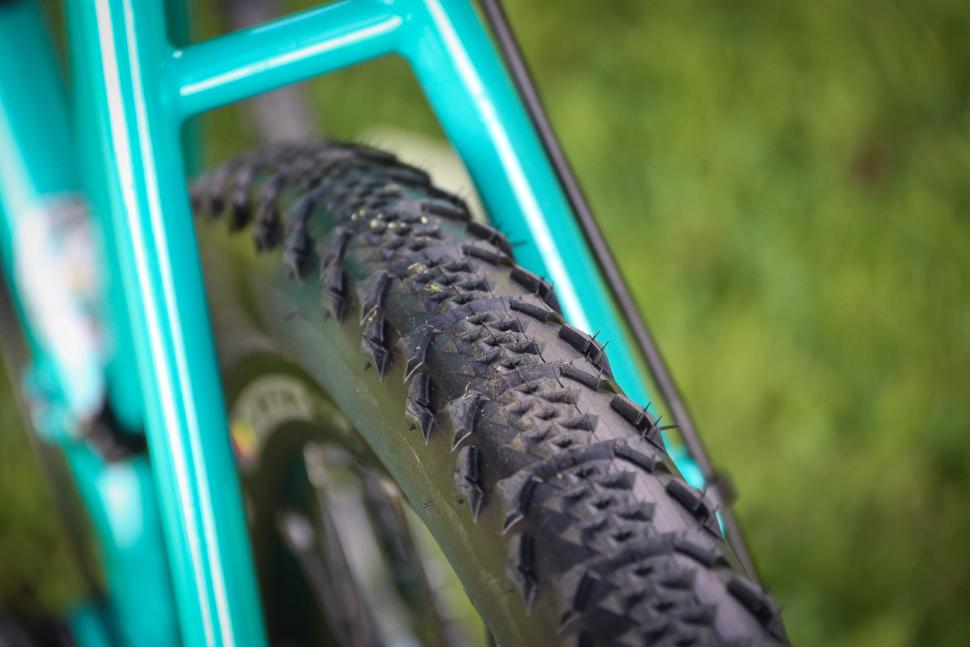
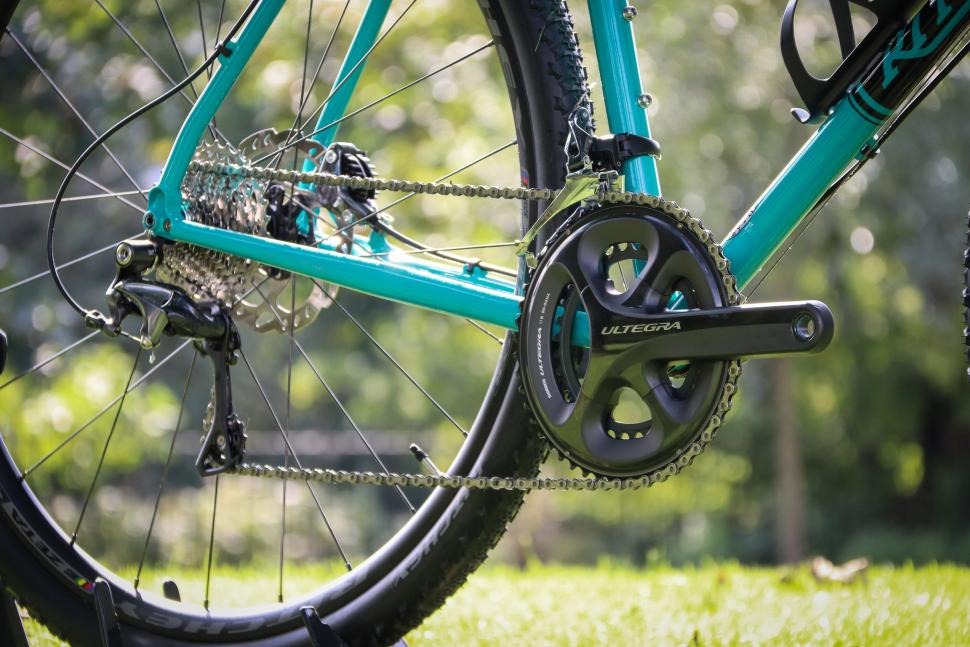
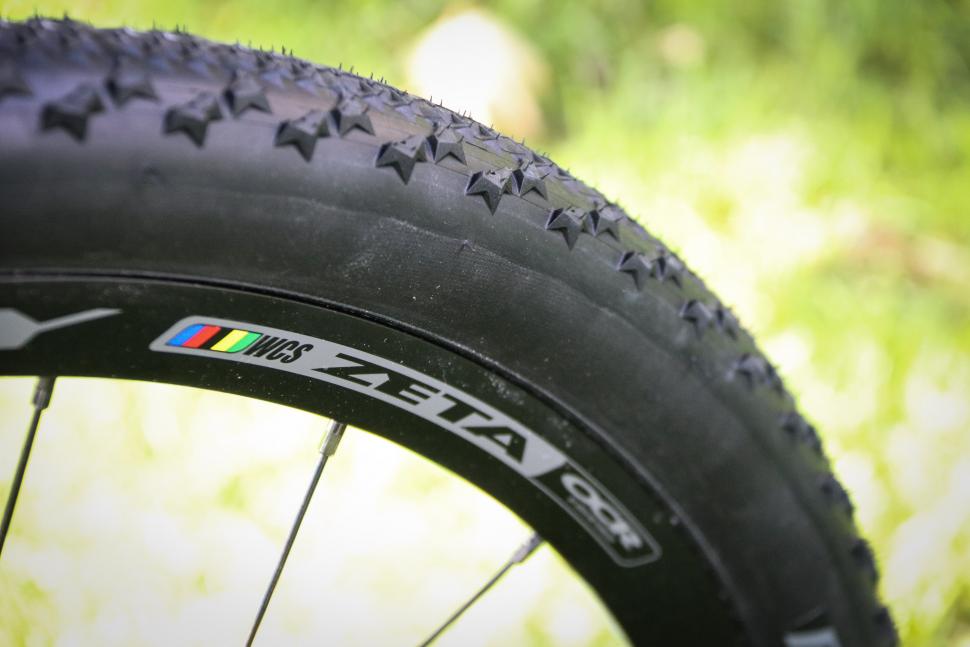
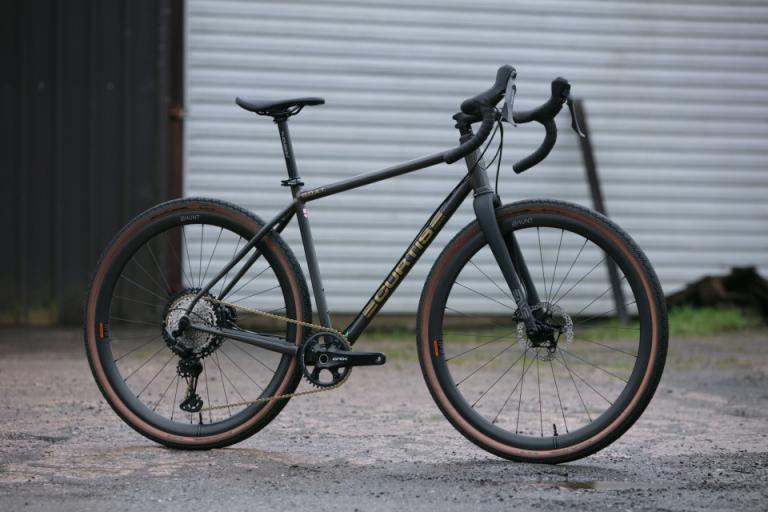

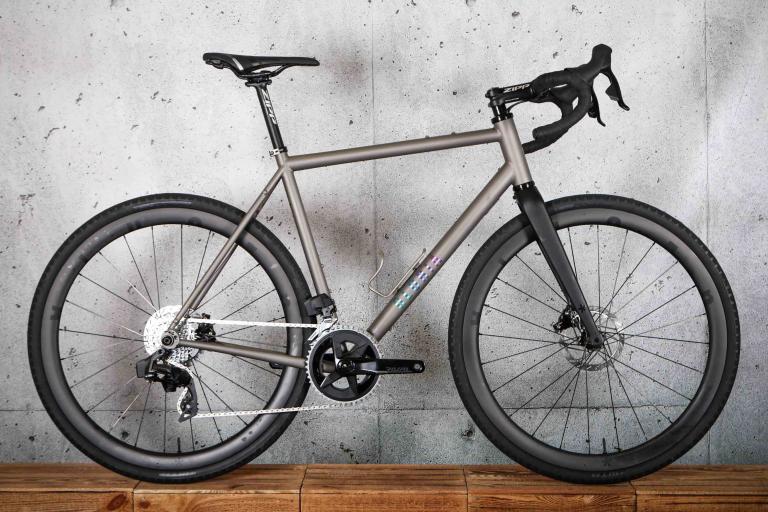
Add new comment
6 comments
looks like a lovely bike but no fender mounts (lack of rack mounts is ok) and no flat mount are just outright stupid. if it had those two things i might have bought one.
Lack of braze-ons seems to be a bit of a Ritchey trademark, which is annoying as I love the brand and the kit but need mudguards at the very least. I know they're tapping into the whole race-bred thing but its a missed opportunity.
That 40c looks awfully tight on the front fork. I didn't try one but I'd imagine clearance was pretty similar on the Swiss Cross, you could certainly get a 38c in there. So, to that extent, given the Swiss can be found for about £400 cheaper, I'm not sure you're gaining very much.
Post mount calipers make it almost immediately obsolete.
Lovely colour.
Perfect summer bike .
.